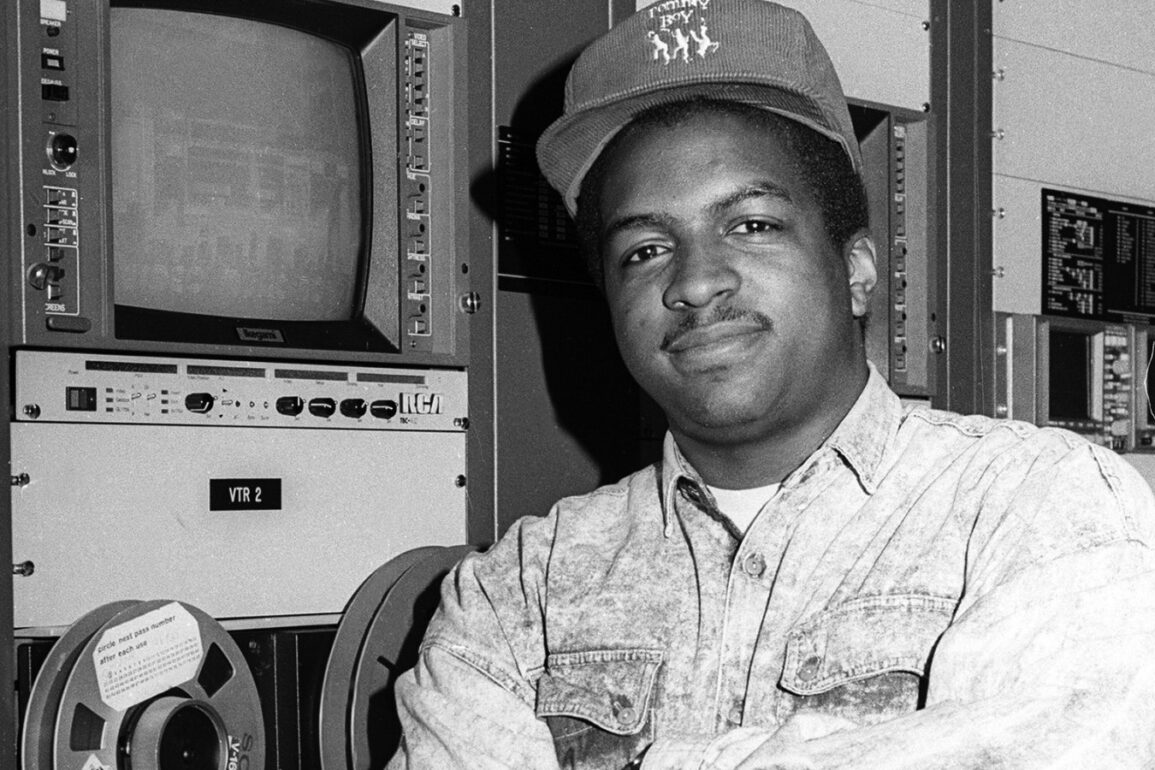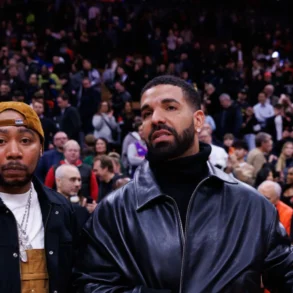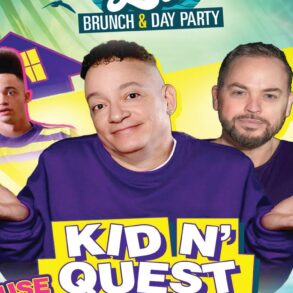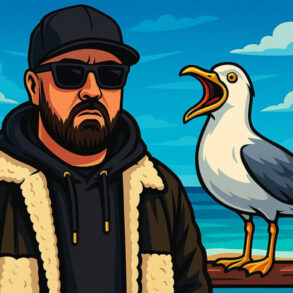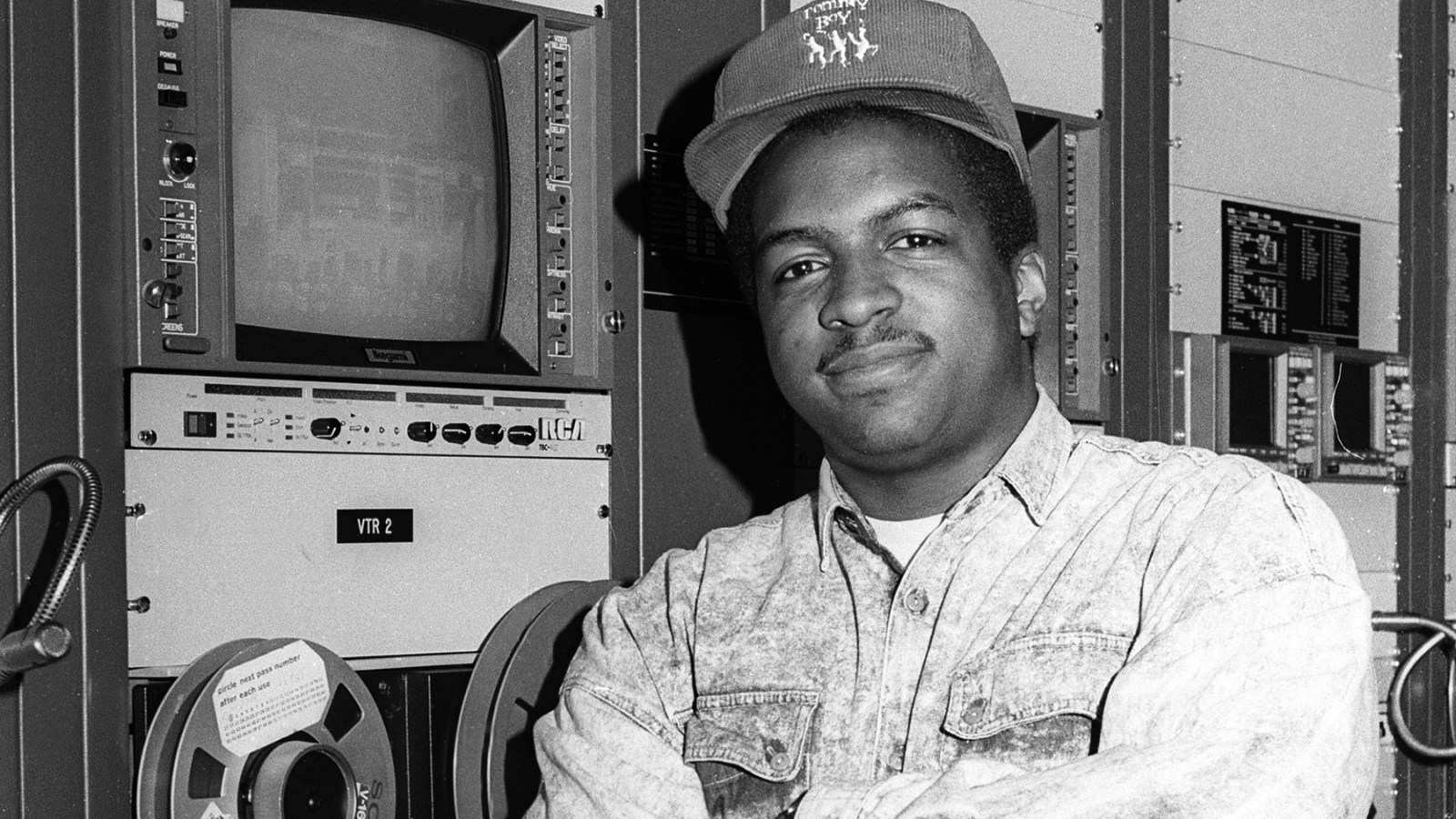
Ralph McDaniels popularized the shout-out.
His show Video Music Box debuted in 1983 on the New York television station WNYC-TV and airs to this day on WNYE-TV, making it the longest-running music video show ever. It was also the first to air hip-hop music videos on television. “Nobody ever said that except me when I said it on TV,” McDaniels says of the on-air shout-out. “People were like, ‘How’s that possible?’ I’m like, ‘Because that was a hip-hop term, and I just said it on TV.’”
The legendary VJ, DJ, music video director, and hip-hop archivist has always been ahead of the curve, even with his latest endeavor, turning part of his 20,000-hour reserve of footage into a YouTube channel. He started the VideoMusicBox1 channel in 2010, featuring classic footage of performances, interviews, and documentaries, including a making-of video about the seminal “Self Destruction” video, a star-studded “stop the violence” track. The highest-viewed video on the channel is a mid-nineties ODB and GZA freestyle, which the man endearingly called “Uncle Ralph,” says may be a one-of-a-kind piece of rap history.
“The crazy part about it is it’s not a song,” he says on Zoom. “It’s a freestyle with ODB doing a beatbox. I don’t think what GZA is saying ever came out [on a song]. It’s a freestyle, and that was it.” He says he randomly recorded the two in a club bathroom. The clip is characteristic of McDaniels’ work to capture hip-hop history, which he says has always been focused on documenting his surroundings. “I want to tell the story. I’m a hip-hop guy. I was there,” he says. “All of these tapes that I have, I knew it was important to tell the story of at least New York hip-hop from my perspective.”
For 20 years, YouTube has served as hip-hop’s default digital archive in lieu of physical spaces. The platform’s freedom of access means anyone can upload content (provided it fits the terms of service), meaning viewers can explore a reserve of music videos that haven’t aired in decades, mixtapes that aren’t available anywhere else, old music-oriented TV programming, and a bevy of other rare content.
In 2022, digital archivist Claudio Abreu uploaded footage of Jay-Z’s iconic 2001 Hot 97 Summer Jam set to his HipHopVCR platform, offering visuals to a moment that had previously only existed through word of mouth (though McDaniels has classic footage of an in-the-zone Jay-Z post-performance). YouTube-based internet platforms such as ZachTV, created by late Chicagoan Zach Stoner, are a valuable chronicle of the Chicago drill scene’s first chapter. Many of the people Stoner spoke with are no longer alive or free to give interviews. Recently released former drug kingpin Demetrius “Big Meech” Flenory has a mythos that inspired Rick Ross’ “BMF” song, multiple documentaries, and a TV show. Much of that aura is thanks to an infamous appearance on the New York-based SMACK DVD, which has been uploaded to YouTube and garnered millions of views.
Hip-hop fans can cull through the service to get an introduction to, or a reminder of, prior hip-hop eras. There’s no other place to hear a 1986 clip of famed radio DJ Mr. Magic telling fans of Jay-Z, “You might be checking out a star of the future,” or a 1989 interview with Tupac during his time as a Nu Afrikan Panther. TV and radio stations don’t often re-air old content, which means interviews and telecasts of yesteryear are in the vault — if they exist anywhere.
At 66 years old, McDaniels’ life coincided with hip-hop’s birth and worldwide expansion. He grew up in Brooklyn and moved to Queens at age 11, where he studied communications at LaGuardia Community College and began working at radio station WNYC in 1983. Soon after, he created Studio 31 Dance Party, which he eventually turned into Video Music Box alongside co-host Lionel Martin.
On Video Music Box, the two sought to showcase hip-hop videos and performances. “I would go to places and see these groups perform, record them professionally, and put it on TV,” he says. “The artists were like, ‘Yo. We didn’t know that that was going to be like that,’” referring to the quality of the video. “I was like, ‘Yeah. I work for a real TV station.’” His reputation as a cameraman grew over the years, as did his reserve of footage.
His genre-spanning vault of footage served as the basis for “You’re Watching Video Music Box,” a 2023 Showtime documentary chronicling his impact on hip-hop culture. The documentary was written by Steve Rivo and Andre Wilkins and directed by Nas, whose first solo music video, “It Ain’t Hard To Tell” from Illmatic, was directed by McDaniels. (“I work with Nas sometimes, and Nas is like, ‘Yo, how did you know that that was important?’ I said, ‘I just knew.’”) McDaniels also directed videos for Roxanne Shante and MC Lyte.
At some point in the early 1990s, McDaniels began working at the venerable New York radio station Hot 97, where he recorded every Hot 97 Summer Jam from 1994 onward. He says he’s still trying to figure out what to do with the footage. It was at Hot 97 when he realized the shift to digital content was happening — the station created a YouTube page in September 2006 — and he realized he also wanted to be present on the platform.
McDaniels says all his archival work is “about teaching,” adding, “young people will find shit on their own. They’ll look for it, and they’ll find it.” He says that, for now, the account is run on instinct. His daughter and brother help him coordinate the page. They also serve as co-partners of his Video Music Box nonprofit. “We just randomly put stuff up right now,’” he says, “I’ll go, for whatever reason, ‘Let’s put up some Big Pun’ or ‘Let’s put up some Large Professor.’ It could be an interview that was just dope.” He says that copyright issues, as well as people swiping his content, have slowed his recent output, and he’s still strategizing how to upload new content.
He recently backed up his vault of tapes during the COVID-19 quarantine period, raising funds through his nonprofit for “high-end archivists” who looked through his VHS tapes and created digital copies. Now, he’s considering his next steps, including potentially collaborating with YouTube executives Lyor Cohen and Tuma Basa to amplify his reserve of footage.
No matter what platform McDaniels works with, he’s adamant about continuing the Video Music Box mission. “We have a story to tell,” he says. “There’s a lot of stories that haven’t been told yet in hip-hop, and I have the footage. When you going to tell a story, somebody wants to see it. More than likely, I got it.”
This post was originally published on this site be sure to check out more of their content.



